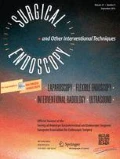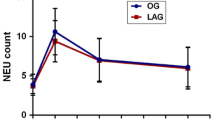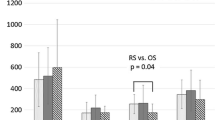Abstract
The purpose of this preliminary study was to evaluate immunologic responses to laparoscopic vs standard open colon resection and to evaluate possible mediators of any differences found. Specifically, we compared cortisol levels and delayed-type hypersensitivity response after each method of colon resection in a group of 20 pigs.
Two groups of 10 animals each were treated in identical fashion including bowel preparation, anesthesia, and postoperative management. The only difference between groups was that one underwent laparoscopic and the other an open colon resection. Blood specimens for cortisol were drawn before, during, and immediately postoperatively as well as at 11A.M. on postoperative days 1 and 2. All animals had been previously immunized as piglets with Sow Bac-E (Oxford Veterinary, Worthington, MN), an antigen preparation of common pig pathogens. At the conclusion of the operative procedure 0.5 cc of the antigen was injected intradermally on the right forelimb of the animals. At 48 and 72 h postoperatively the largest diameters of induration surrounding the injection site were measured and averaged. Cortisol levels were measured in serum samples by radioimmunoassay (Met-Path, Rockville, MD). Statistical significance was determined by t-test.
Results of skin antigen testing showed that the group of pigs that underwent laparoscopic resection had a 20% greater response, 1.54 cm±0.28 cm at 48 h and 1.53 cm±0.18 cm at 72 h. For the open-surgery group results were 1.24 cm±0.26 cm at 48 h and 1.32 cm±0.21 cm at 72 h,P<0.05 for the difference between groups at both 48 and 72 h. Cortisol levels were not significantly different between groups at any of the time points.
We conclude that T-cell-related immune function in this model, as measured by delayed-type hypersensitivity, is better preserved after laparoscopic than open colon resection. We further conclude that cortisol levels are not responsible for the improved preservation of the immune response. The benefits of improved postoperative immune function may be significant for patients undergoing laparoscopic colon resection.
Similar content being viewed by others
References
Blumberg N, Heal JM (1989) Transfusion and host defense against cancer recurrence and infection. Transfusion 29: 236–245
Cook JL (1988) Natural killer cell activity associated with human neoplasms. Nature 305: 1323–1324
Eilber FR, Morton DL (1970) Impaired immunologic reactivity and recurrence following cancer surgery. Cancer 25: 362–367
Falk PM, Beart RW, Wexner SD, Thorson AG, Jagelman DG, Lavery IC, Johansen OB, Fitzgibons RJ (1993) Laparoscopic colectomy: a critical appraisal. Dis Colon Rectum 36: 28–34
Francis DMA (1991) Relationship between blood transfusion and tumor behaviour. Br J Surg 78: 1420–1428
Hammer JH, Nielsen HJ, Moesgaard F, Kehlet H (1992) Duration of postoperative immunosupression assessed by repeated delayed-type hypersensitivity skin tests. Eur Surg Res 24: 133–137
Hjortso NC, Kehlet H (1986) Influence of surgery, age and serum albumin on delayed hypersensitivity. Acta Chir Scand 152: 175–179
Lennard TWJ, Shenton BK, Borzotta A (1985) The influence of surgical operations on components of the human immune system. Br J Surg 72: 771–776
Nielsen HJ, Hammer JH, Moesgaard F, Kehlet H (1991) Comparison of the effects of SAG-M and whole-blood transfusions on postoperative suppression of delayed hypersensitivity. Can J Surg 34: 146–150
Pietsch JB, Meakins JL, MacLean LD (1982) The delayed hypersensitivity response: application in clinical surgery. Surgery 82: 349–355
Schiermer PA, Longnecker DE, Mintz PD (1988) The possible immunosuppressive effects of perioperative blood transfusion in cancer patients. Anesthesiology 68: 422–428
Tarter PI (1992) The association of perioperative blood transfusion with colorectal cancer recurrence. Ann Surg 216: 633–638
Wexner SD, Johansen OB, Nogueras JJ, Jagelman DG (1992) Laparoscopic total abdominal colectomy: a prospective trial. Dis Colon Rectum 35: 651–655
Author information
Authors and Affiliations
Rights and permissions
About this article
Cite this article
Bessler, M., Whelan, R.L., Halverson, A. et al. Is immune function better preserved after laparoscopic versus open colon resection?. Surg Endosc 8, 881–883 (1994). https://doi.org/10.1007/BF00843460
Received:
Accepted:
Issue Date:
DOI: https://doi.org/10.1007/BF00843460




